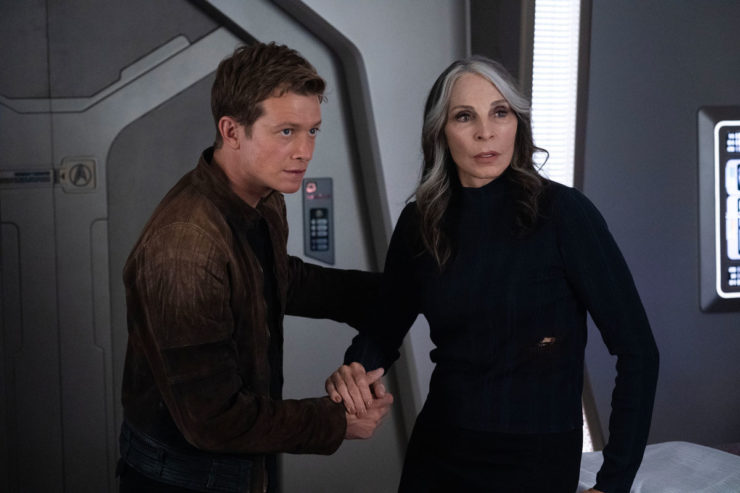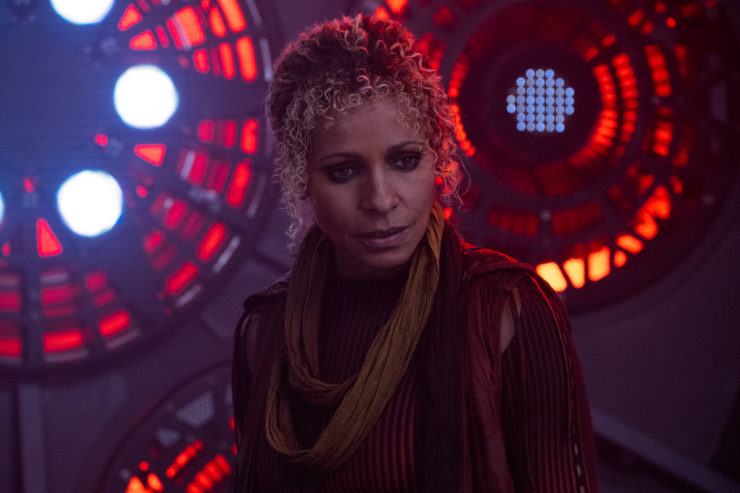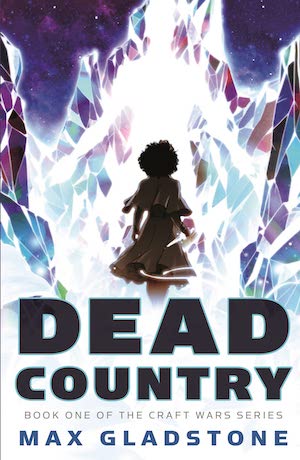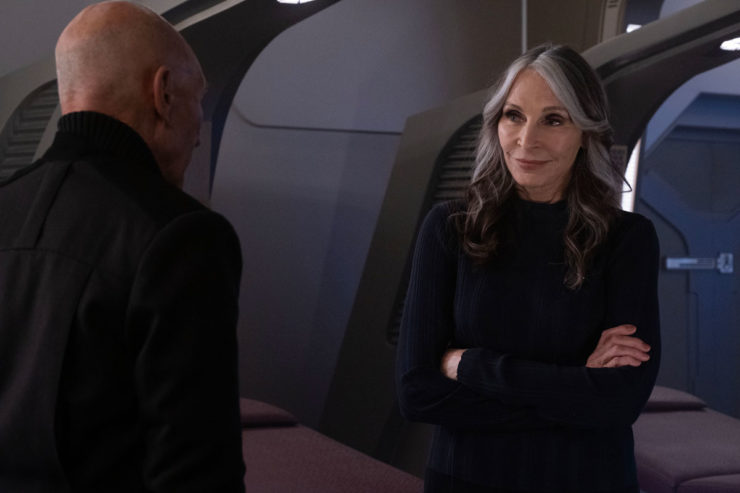A big part of the appeal of the TNG reunion that we have been promised in season three of Picard is answering the question, “What’ve they been doing for the last two decades?” The first two seasons answered that question for the title character, and various episodes of Lower Decks and this show have done likewise for Riker and Troi.
This week, we get answers for both Crusher and Worf, and that, at least, is a mixed bag. It’s the best episode of the season so far, though, because everything is starting to come together in a manner that has some delightful surprises, not just for TNG fans, but fans of DS9 as well…
Let’s start with the more problematic revelation: that Crusher had a kid with Picard and neglected to inform him, instead ghosting him and the rest of the crew and raising the kid on her own.
There’s a lengthy argument in the Titan sickbay between Picard and Crusher on the subject, in which both sides make compelling arguments. Picard is, quite rightly, pissed off that Crusher didn’t even give him a chance to know he had a son. Crusher counters that, shortly after the liaison that led to her pregnancy, Picard was nearly killed on several different occasions back to back in various dealings mostly with Romulans.
(We’ll leave aside the absurdity of there still being accidental pregnancies in the twenty-fourth century given how advanced medicine is in the future. One can come up with justifications for it, but that’s less relevant than the fact that the script, credited to co-executive producer Jane Maggs & producer Cindy Appel, didn’t bother to come up with one, which indicates not giving it any thought or considering it important, which is certainly a choice.)
While Crusher’s argument is not a bad one, it’s not a great one, either, but she has more bullets in that particular gun. One is that Picard was established from jump as not wanting or liking kids. Another is that she has seen her late husband (Jack Crusher, who died on an away mission while serving on the Stargazer under Picard, established in TNG’s “Encounter at Farpoint”), her first son (Wes Crusher, who became a cosmic being in TNG’s “Journey’s End”), and her on-again-off-again lover get lost to the stars, as she put it.
And she also says that, when Jack was of age, she gave him the choice to reach out to his father—thus making it clear that he did know all along, which was not clear from last week’s episode, and adds some serious texture to the conversation the pair of them had in the brig—and he declined the honor.
This whole thing is problematic on several levels. First of all, Crusher’s argument that she took Jack away to keep him safe rings hollow given that Jack has spent his entire adult life building up an impressive rap sheet and performing lots of dangerous acts. Secondly, Picard spent fourteen years sitting on his ass in France growing grapes, starting in 2385, when Jack couldn’t have been more than five years old. (Jack had to have been born after Nemesis, which was in 2379.) Nobody cared enough about him during most of those fourteen years to attack him or for him to be a danger to be around, so Crusher’s protection notion falls on its face there, as well.

Finally, the best they can come up with for Crusher to have spent the last twenty years doing was being a Mama Bear for her and Picard’s kid? Seriously? This is exacerbated by this episode being Marina Sirtis’ first appearance of the season, except it’s in a flashback to shortly after Thaddeus Riker was born, and she only appears for twenty seconds on a viewscreen being an exhausted mother bitching about how Thaddeus has thrown up all over engineering.
One of the complaints about TNG was that the female characters (who stuck around past season one, anyhow) were all in nurturing roles: Crusher (and Pulaski) the doctor, Troi the therapist, Guinan the bartender and dispenser of wisdom. This reductive notion has been carried over to this series, with Crusher and Troi’s only role in these first three episodes being Mother.
Well, okay, Crusher also briefly gets to be a doctor, as she pretty much saves Shaw’s life, and later does the same for Jack. As expected from the end of last week, the Titan spends the episode playing cat-and-mouse with the Shrike, with Titan very much in the role of “mouse.” During one confrontation, Shaw is badly injured, and Crusher is the one who has to save him, as the Titan chief medical officer Dr. Ohk (Tiffany Shepis) can’t figure out what’s wrong with him. This serves as a nice little fuck-you to Ohk, who earlier rejected Crusher’s assistance because it would take her too long to bring her up to speed on the last twenty years of advances in Starfleet equipment. As if Crusher wouldn’t have kept up…
Shaw, by the way, takes several steps toward redemption here. True to character, he turns command functions over to Riker when he’s hurt (since his first officer is still confined to quarters), not out of any sense of duty, but because, as he says, Riker and Picard got them into this mess, they get to get them out of it. Shaw is also the one who asks the important question of how the Shrike keeps finding Titan in the nebula. This leads Jack to thinking and working with Seven to find out if there’s a saboteur on board.
It turns out that there is one, and it’s an ensign whose face moves when Jack punches him. This will be important later…
The Titan portion of the plot gives us a chance to explore the Picard-Riker dynamic, and in particular how it’s changed. We start with the flashback to Picard and Riker drinking a toast to the latter’s kid (complete with Jonathan Frakes’ hair dyed brown—but his beard more salt-and-pepper, a nice touch—and both Frakes and Sir Patrick Stewart digitally de-aged in that manner that makes their eyes look incredibly sunken…). At this point, the new dynamic is still, well, new, plus Riker’s off on his own ship now. But they’re not captain and first officer anymore, and in the present we see that the pair of them aren’t always on the same page.
More to the point, this is the latter-day Picard that we’ve seen on this show for a couple years now whose super-power as he’s gotten older is to royally piss off everyone who’s ever cared about him. And the admiral does a lovely job of doing that, mostly by bullying Riker into fighting the Shrike, even though it’s a fight Riker knows they can’t win. More to the point, they have to protect this crew that they stupidly endangered with their dumbshit off-book mission. And in the end, when the Titan has had the shit kicked out of it thanks to Vadic’s clever use of a portal weapon (like the one that destroyed the Starfleet Recruitment Center), Riker kicks Picard off the bridge.
And yes, Vadic has a portal weapon also. And that’s not the only link between Vadic’s pursuit of the Crushers and the mission Worf sent Musiker on.

First of all, let me just say that I cheered three or four times when Musiker woke up and confronted Worf on La Sirena. His introducing himself was just epic: “I am Worf, son of Mogh, House of Martok, son of Sergey, House of Rozhenko, bane of the Duras family, slayer of Gowron. I have made chamomile tea—do you take sugar?” Bliss…
It’s not entirely clear what Worf has been doing for all of the last twenty years, but he doesn’t appear to be in Starfleet anymore, and he himself describes his work with Starfleet Intelligence as being akin to a sub-contractor. He is also, as he puts it, working on himself, trying to find a better balance in his life. This is much more complex and interesting than what the trailers indicated—that he’s a pacifist now—showing us that Worf is trying to evolve.
What’s especially nifty about Worf’s mission—for which he promotes Musiker from subordinate to partner—is that it ties, not to his days on the Enterprise, but rather his time on Deep Space 9.
One of the complaints I’ve read in some places about this season of Picard so far is complaining that Musiker’s plot seems unconnected to the rest of it. And also that it’s not that interesting, which I can’t agree with at all, as Michelle Hurd is doing superlative work here. Her chemistry with Michael Dorn is exceptional, and watching the pair of them do espionage is an absolute joy. Now I want a Worf and Raffi, Agents of Starfleet series on Paramount+ in 2024. Get on that, Secret Hideout!
Worf knows full well that T’Luco isn’t the real bad guy, but he’s letting that remain the public story while he seeks out the one truly responsible. When Musiker complains that she told him that and he wouldn’t let her go after Sneed, Worf tartly points out that he was concerned that she’d get herself killed, and he was right.
They go after the one who paid Sneed to lie: Titus Rikka, who appears to be human. They interrogate him and Musiker thinks he’s going into withdrawal, but it turns out he’s a changeling who needs to regenerate. Eventually he reverts to liquid form and Worf has to kill him.
But it confirms his own theory, and why he’s been on this mission. He was told by a member of the Great Link that there was a schism among the changelings. Worf’s informant is identified only as a man of honor, but it’s obviously Odo he’s talking about. (And I’m really sad that Rene Auberjonois’ death means we probably won’t get to actually see Odo.) A rogue group of changelings is behind the theft of the items from Daystrom, including the portal weapon used to destroy the recruitment center.
Thing is, the Shrike has a portal weapon as well. They use it to keep Titan inside the nebula, and then, rather devastatingly, use it to turn Titan’s own weaponry on itself. What’s more, there’s a changeling on board Titan. (Played by Chad Lindberg, who will always be Ash on Supernatural to me…)
Buy the Book


Dead Country
The pre-release publicity for who the antagonists for this season of Picard would be included Amanda Plummer’s Vadic, Daniel Davis’ Moriarty (from TNG’s “Elementary, Dear Data” and “Ship in a Bottle”), and Lore (from TNG’s “Datalore,” “Brothers,” and the “Descent” two-parter).
Nothing was mentioned of bringing the Dominion back, and it’s a beautiful and welcome surprise. And it ties our two stories more closely together.
Dorn also plays this older version of Worf beautifully. I’m eager to learn more about what prompted this change, but I also like that he’s become more centered and less aggressive. It suits him.
I want to also give props to two excellent supporting performers. One is Ashlei Sharpe Chestnut’s Sidney La Forge, who visits Seven in her quarters for a heartening pep talk (and calls her “Commander Seven”). The other is Stephanie Czajkowski’s Lieutenant T’Veen, whose portrayal of a Vulcan I’m really digging. (It’s a far cry from Czajkowski’s last role, as the Hammerhead part of Crazy Jane’s multiple personalities on Doom Patrol…)
And hey, Marina Sirtis gets a special guest star credit for twenty seconds on a viewscreen. Again, nice work if you can get it…
The show is spending way too much time channeling Trek movies. In these three episodes alone we’ve had music cues from The Motion Picture, roaming around sleazy locations like in The Search for Spock, having a former pilot’s daughter now flying the ship like in Generations, a ship that looks like Scimitar from Nemesis in the Shrike, and finally, dozens of hits from The Wrath of Khan: chasing through nebulae, more music cues, the main character wearing glasses to remind us he’s old, and a surprise son from the main character’s past whose mother didn’t want the kid raised in Dad’s world. Which is why the DS9 hits were a breath of fresh air. Indeed, between that and Seven’s continued presence, we’re getting tributes to all three twenty-fourth-century shows! I’d rather have more of that than attempting to remind us of movies…
Keith R.A. DeCandido has written several works of Star Trek fiction that heavily featured the character of Worf, including the novels Diplomatic Implausibility, The Brave & the Bold Book 2, The Art of the Impossible, A Good Day to Die, Honor Bound, A Burning House, A Time for War, a Time for Peace, and Q & A; the novella Enterprises of Great Pitch and Moment; the short stories “Revelations” in New Frontier: No Limits and “Family Matters” in Mirror Universe: Shards and Shadows; and the comic book miniseries Perchance to Dream.










